- Home
- Andrew Wareham
Foreign Mud Page 2
Foreign Mud Read online
Page 2
The opium hulks were all trading ships that could no longer put to sea. What had been done with their guns, I did not know – presumably they had been taken away by the original owners. There was certainly a need for additional hulks – a purchase would seem entirely normal. The lord instantly saw the reasoning and approved of the suggestion.
Muskets were another matter. John Company was far less concerned to control their production, probably because they had realised it to be impossible. Any medium sized foundry could run out musket barrels and sell them on to woodworkers to fit to butts, hand carved for pennies. Building a lock was a matter of simplicity – the small castings made in back street smithies and the springs bought in from specialist makers in steel. The springs were in fact the single most expensive part of the musket, the most difficult to forge. A good Short India Land Pattern musket could be made in Bombay at a third of the English price and in half of the time. I could not imagine why they were not produced in China and asked why.
“They are forbidden, by the Emperor, and the metalworkers will not risk their lives, and their families’, to make them.”
“One year for muskets, my lord. The order to go to Bombay on the outward fleet and be returned on the next.”
The lord listened to the translation and asked if the process could not be speeded up.
“A fast ship could sail to Bombay at any time and the goods could be brought back after a short delay to make them or take them from various warehouses.”
“A single ship is at risk from pirates, my lord.”
“My lord says that the ship will fly his pennant.”
I knew that guaranteed the safety of the vessel in Chinese waters. In the South China Sea it was a less certain talisman, but the greatest danger lay within two days sailing of Canton.
“Let it be so, Mr Fong.”
I wondered if they wanted me to sail in the ship to Bombay, but they told me that any junior could take the order to the foundries. I was too valuable a man and must stay in Canton and Macao.
“The lord says he cannot change the Hoppo’s order that no gwailo is to remain in Canton and Whampoa when the merchant fleet has sailed. That is an irritation – one of many that men of business suffer of late years. It may well be possible to change the Hoppo at some time in the near future.”
The factories had to be emptied and closed down when the ships sailed – a great nuisance to traders. It would make more sense for the shroffs and compradors at least to remain through the off season and trade for the goods which they would load upon the next ships to enter Chinese waters. Obviously, we busied ourselves in Macao, which was exempt from the order, but we really wanted to gain year-round rights of residence in Whampoa at least.
I made my bows and walked backwards from the presence – it would have been gratuitously offensive to have shown the lord my back.
In later years I tried to explain that to deputations from Britain and India, attempting to negotiate with the Empire. They could not understand that offering courtesy to the Chinese was not to demean themselves. Damned fools, I thought. My son is exactly the same – mistakes sneering arrogance for honest pride.
I spoke to Fong when safely distant from the lord’s presence.
“Thank you, Mr Fong. I am indebted to you. Have you a suggestion for who should take the order to Bombay?”
“You, of course, Mr Giles. The lord said that your junior could take the order, knowing that you have no other gwailo available other than mere soldiers and that you must do it yourself.”
“I am still young in the ways of China, Mr Fong. I did not understand.”
Mr Fong accepted my apology, saying that he was coming to appreciate the extent to which we differed.
“How many muskets, Mr Fong, and at what price?”
“I shall send gold and silver on the ship that is to take you to Bombay, Mr Giles. Buy all that you can for the money.”
He was placing temptation before me, quite deliberately. I did not doubt that he would have informants to tell him the market price of a musket – he would see whether I would take an unlawful cut on each piece I bought.
“You have supplies of powder and ball, I know, Mr Fong. Do you want pistols as well or muskets only? Should I purchase musketoons?”
He did not know the musketoon and I had to explain it – a heavy musket firing a cone of slugs over twenty to thirty yards.
“They are useful indeed when facing an attack on a wall, or at sea when dealing with a boarding party.”
“A half company perhaps, Mr Giles. Fifty men with muskets, another fifty with the musketoon – they could hold a gate or charge an armed party.”
I agreed. Knowing all that I did of Chinese soldiers, I thought that any weapon that could be discharged without too much aiming had much in its favour.
“Pistols are carried by your officers, Mr Giles. Ours have their swords to set them apart from the lowly ruck.”
“That of course is true, Mr Fong. The pistol has its uses at close quarters. It is possible to carry a bandoleer of six pistols, and I have heard of more. To have six shots available in battle can be handy.”
Mr Fong briefly considered my suggestion before negativing it.
“An officer should not indulge himself in the vulgarities of close combat, Mr Giles. His sword is a badge of rank; it is not to be used in fighting. He might perhaps wish to take the head of a captured enemy or of one of his own men who had caused offence, but he has no other use for it.”
Fong knew my opinion of officers who would not fight at the head of their men. It was not the Chinese way, he said. I would not repeat a lost argument. I still think he was wrong. Well led, your Chinese is a fierce fighting man – seen it more than once. With a coward shouting him to go forward and staying clear himself, the Chinaman is like any other soldier – he will run. Not my affair, however, especially when I had no intention of fighting anybody at that time.
“Very well, Mr Fong. What are your proposals for a ship?”
“The lorcha that brought you to Whampoa today, Mr Giles. She is big enough to carry a cargo of forty of your tons. Five thousand muskets well packed in wooden chests.”
I nodded. She was a fast little ship and could make the voyage easily.
“When, sir?”
“Three days hence, Mr Giles. She will carry you to Macao tomorrow and delay there for two nights while you ready yourself. She is loaded and provisioned, or should be by now. Her master was instructed to prepare his ship for the voyage and was given free run of the warehouses and food stores.”
I did not doubt that the young gentleman would have obeyed his orders.
“Very good, Mr Fong. I started a long book on the voyage from Macao and did not have time to finish it…”
He smiled and assured me it would be aboard. He was glad, he said, to see such evidence of a scholarly nature in me.
I knew he would discover the title and told him it was a work of fiction, one of the leading novels to have been written in England.
“Ah! There is much to be said for a well-written tale. We have many such in China. Literature is valid, Mr Giles.”
Quite what he meant by that last comment, I did not know.
“There will be a number of books placed aboard for your delectation, Mr Giles. It is good for a young gentleman to read.”
He was a serious-minded man, Mr Fong, far more so than me. He had, I guessed, climbed high in a hard-working life and was still no more than ten years my senior. I suspected he might reach a long way up in his triad. I was right in that, to my advantage in later years, but that is yet another story, provided I live long enough to tell it.
I reached Macao in the dawn and was set ashore to run and demand the presence of the shroff.
“I am ordered back to Bombay, shroff. I have no choice other than to obey, would you not agree?”
“You must indeed, sir.”
“Good. I am to go to Bombay and there pick up five thousand muskets and musketoons of good
quality. They are to come back here as soon as is possible, myself with them. In exchange, shroff, all opium sold in Canton next year will go through our hands. Every last head of foreign mud will pay us a commission – no other merchant will be permitted to sell. The price is yet to be set but will not be ungenerous. You will see to that yourself.”
“Oh, I shall indeed, sir! I suspect we may purchase from the other merchants and set our own buying price, being the sole outlet.”
“Remember the goose and the golden eggs, shroff.”
He knew the fable and nodded grimly. He would not kill his own market.
We spent the whole of that day and most of the next working up copies of our books to show to Mr Ainslie and writing a report for the benefit of the Governor in Bombay and another, not quite identical, for the Company. There were some things which the Company must know but the Governor should not – he was a political appointee and his discretion could not be trusted.
The shroff came to me in the pre-dawn of sailing day carrying a heavy purse.
“Gold coins, Mr Giles. To the value of five hundred English sovereigns. Always wise to carry gold when sailing these waters. You may wish to pay a bribe. It might be possible to pick up a cargo.”
It made good sense. I tucked the purse away in my bag that I was to take aboard with me, taking pains to carry it lightly and not show its true weight. Two porters arrived to pick up my luggage, for I was an important man and could not travel light. I had to take a set of changes of clothing and some basic comforts for my cabin, even though they were unnecessary. I bade my handmaidens farewell and assured them I would return and set off, trotting to make a show of not being late. Fred followed behind, carrying his own bag; as always he wore a sword and visibly carried pistols and had his pair of old dragons tucked away at the top of his bag.
The wind was not especially good but the lorcha cast off immediately I stepped aboard – nothing was to delay the lord’s business. He had ordered that we sail at dawn, therefore we would have done so even if there were a typhoon blowing.
The little ship made tack after tack and secured an offing, but Macao was still in clear sight in mid-afternoon. We made it out to sea eventually and the captain set a course that took us in almost the opposite direction to that we wanted, needing searoom before he eventually made a westing. I was little interested in the mechanics of sailing the lorcha, knowing almost nothing of such seamanship. Besides, I had other things to do.
I had briefly inspected my cabin and had found it to be divided in two, a separate sleeping compartment from the eating and leisure quarters next door. When I took a less cursory glance, I discovered my bags to have been unpacked and tucked away and a pair of young females busily putting all to rights. They assured me in Pidgin that they were there for my comfort on the voyage.
It seemed the lord believed that young men needed to be kept amused.
I had no overwhelming objection to that concept.
Chapter Two
I came on deck next morning to discover the lorcha sailing to the south-east, still seeking searoom for the series of long tacks that would eventually take us through the South China Sea and the Spice Islands to make our westing and reach the Indian Ocean. With the wind as it was, we might be looking at a twelve week voyage even in so handy a little ship.
The master of the lorcha bowed and told me all was well with the ship but that there was a pirate fleet within view to windward.
I followed his pointing finger and saw a mass of sails well distant to the southwest of us.
The master had hoisted his lord’s pennant and expected no trouble; we would, however, be delayed while we were inspected. It was the case, after all, that any man might raise a flag; a wise pirate would make sure that we flew the ensign legitimately.
“It would be so, after all, young lordship, that my lord would be much irritated if he discovered that a false flag had been flown, that his name had, as one might say, been taken in vain.”
I agreed, noting that the master had been educated by a missionary, that his very good English had been acquired probably in India. To my knowledge, there were no missionaries active in or around Canton and those in Macao were exclusively Portuguese. I wondered how it had come about.
“Will you prefer me to remain below, in my cabin, sir? Would the presence of a gwailo be seen as an embarrassment?”
“Not at all, Mr Jackson. Your name is known to the pirate fleets – you played a part in the destruction of one of the admirals. Some will wish that they could spend a day or two killing you interestingly, sir, while others will be inclined to admire your ingenuity. All will be intrigued that you are on such remarkably good terms with my lord. None, of course, will dare lay hands on you. They may believe they should make apology for inconveniencing you. One may hope so. No, sir, I would beg you in fact to make a display of leaning on the stern rail and watching them as they approach.”
“All very casual and rather arrogant – I am to be aware of my own untouchability. Would it be as well to have tea to hand, that I might sip casually at my leisure?”
The master smiled. He thought that might well cause a degree of irritation.
The charade would have the effect of forcing me even further into the hands of his own lord – I would be a marked man, to be thoroughly chopped was I to be cast adrift by my patron. It would be wise, I suspected, if I were to make myself indispensable or to disappear a long way west. I took my place at the stern rails and called Fred to my side – such an important chap as I was could not be unattended.
The master brought the lorcha up into the wind – or so I believed the process to be described. Suffice it to say that he somehow reversed the sails leaving them to slap against the masts, the ship unmoving, except for a very substantial roll in the ocean swell. The pirate fleet closed steadily and a pair of junks were sent across to inspect us.
They were large vessels, four or five hundred tonners at a guess, and full of men – literally hundreds of mostly bare-chested coolies carrying swords or spears and the occasional musket. They stood silently watching, sure that they would have nothing to do but hoping nonetheless. The men were paid exclusively by shares in their spoils, a pittance for risking their lives but more than they could make ashore.
I made a show of lounging at my ease while I inspected the junks closely for future reference. Both carried a few cannon, bronze guns and not very large – old three or four pounders taken from traders over the years. I could see smoke at one gunport, only one slowmatch lit and presumably just the single serviceable cannon between the two vessels. The lorcha with its pair of iron six pounders and a single nine pound sternchase gun was more powerfully armed.
The slightly larger of the two junks came close to us and shouted. I presumed in Cantonese, but I had no knowledge of the tongue. The master replied, briefly.
What was said, I don’t know, but the questioner on the junk gave a low bow and whistled to his crew to set the sails and pulled away.
The master set sail in his turn and we rapidly made a distance on the fleet.
“How do so many pirates make a living, Master?”
He shrugged, tried to find words that would not make his country sound discreditable in the ears of an arrogant foreigner.
“They collect, how should I say, a tax upon the coast, paid by the officials, in exchange for which they leave the fishing boats alone and do not molest the villages. When there is war, they will attack the enemy. Almost, they are a navy, but one that pays for itself when possible. Every few years, one or other of the fleets will raid southerly down the coasts towards those foolish places which have declared themselves independent of the Qing. On occasion, they will attack the islands of Japan. They are not quite pirates as you gwailos know them.”
I accepted the explanation, not mentioning that it made less than perfect sense to my foreign ears. They were not pirates; they were not honest sailors; they did not fly the flag of the empire; they were patriotic gentlemen who carried o
ut the Emperor’s policies…
A little thought told me they could be disavowed – they were not under the orders of the Qing and they cost Peking nothing. If they took a foreign merchantman – how shocking! If a foreign fleet destroyed them – how fortunate!
My schooling had given me a vague knowledge of the buccaneers of the Caribbean, avowed enemies of Spain and serving the interests of the British and French monarchies yet no more than pirates, in the eyes of the law. Captain Morgan, a noted buccaneer, became Governor of Jamaica. Another of the breed became Archbishop of York in the fullness of time, leaving the pursuit of gold to become a catcher of souls – Church of England, of course; anything is possible there.
I suspected that some of the pirate kings might retire from the sea as mandarins.
John Company might benefit from an explanation of the nature of the pirate fleets. They had tended to regard them as no more than banditti, to be wiped out on sight. It might be wiser to treat them as possible allies who could assist the Company in the maintenance of a British monopoly of the Canton trade. There was the question of the Company’s relationship with the triads, also important. It was likely that there was no understanding of the role of the triads in government, of their true place in China. It would not be easy to persuade men like Mr Arbuthnot of the ultimate reality of Canton, and it might not even be necessary - let the big men hold to their delusions, while the actual traders kept their eyes wide open.
The wind eased over the next few days and became far more favourable for our westerly course. The master showed himself pleased, explaining that his lord was not himself a seaman and might be puzzled that a voyage could take eight weeks on one occasion, twelve on another.

 A Killing Too Far
A Killing Too Far Killing's Reward
Killing's Reward A New Place
A New Place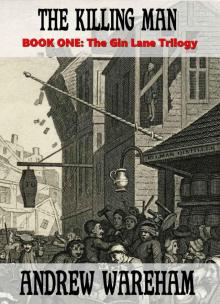 The Killing Man
The Killing Man Bold and Blooded
Bold and Blooded The Breaking Storm (Innocent No More Series, Book 2)
The Breaking Storm (Innocent No More Series, Book 2) Nobody’s Child
Nobody’s Child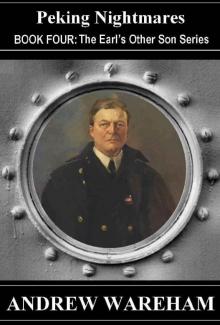 04 Peking Nightmares (The Earl’s Other Son Series, #4)
04 Peking Nightmares (The Earl’s Other Son Series, #4)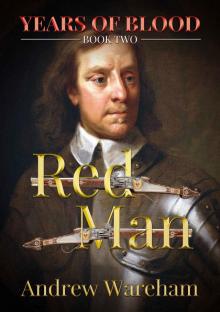 Red Man
Red Man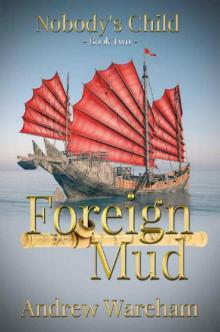 Foreign Mud
Foreign Mud The Gathering Clouds (Innocent No More Series, Book 1)
The Gathering Clouds (Innocent No More Series, Book 1) 06 A Soldier’s Farewell (Man of Conflict #6)
06 A Soldier’s Farewell (Man of Conflict #6)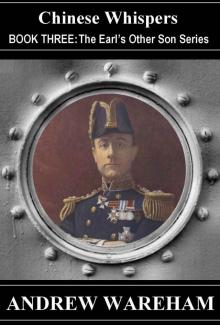 Chinese Whispers
Chinese Whispers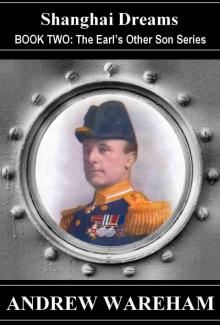 02 Shanghai Dreams (The Earl’s Other Son #2)
02 Shanghai Dreams (The Earl’s Other Son #2)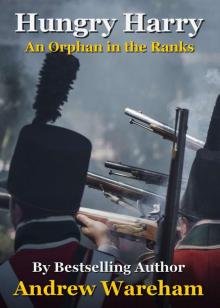 Hungry Harry: An Orphan in the Ranks
Hungry Harry: An Orphan in the Ranks A Wretched Victory (Innocents At War Series, Book 6)
A Wretched Victory (Innocents At War Series, Book 6) Illusions Of Change (A Poor Man at the Gate Series Book 6)
Illusions Of Change (A Poor Man at the Gate Series Book 6) The Wages Of Virtue (A Poor Man at the Gate Series, Book 8)
The Wages Of Virtue (A Poor Man at the Gate Series, Book 8) Blood and Famine (Man of Conflict Series, Book 4)
Blood and Famine (Man of Conflict Series, Book 4)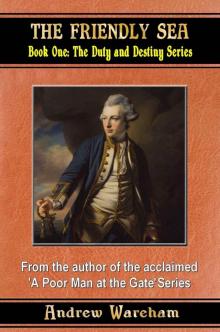 The Friendly Sea (The Duty and Destiny Series, Book 1)
The Friendly Sea (The Duty and Destiny Series, Book 1)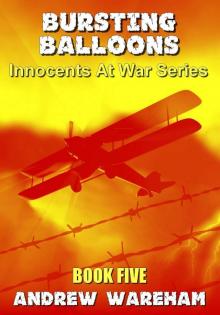 Bursting Balloons (Innocents At War Series, Book 5)
Bursting Balloons (Innocents At War Series, Book 5) The Death of Hope
The Death of Hope Deadly Shores (The Duty and Destiny Series, Book 11)
Deadly Shores (The Duty and Destiny Series, Book 11) The Vice Of Virtue (A Poor Man At The Gate Series Book 10)
The Vice Of Virtue (A Poor Man At The Gate Series Book 10) Virtue’s Reward (A Poor Man at the Gate Series, Book 11)
Virtue’s Reward (A Poor Man at the Gate Series, Book 11)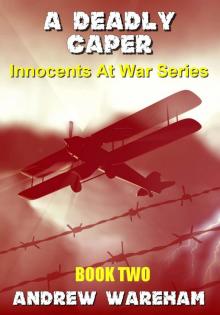 A Deadly Caper (Innocents At War Series, Book 2)
A Deadly Caper (Innocents At War Series, Book 2)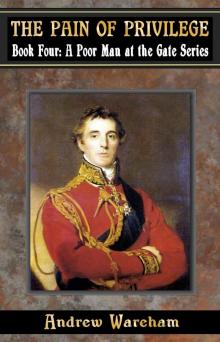 The Pain Of Privilege (A Poor Man at the Gate Series Book 4)
The Pain Of Privilege (A Poor Man at the Gate Series Book 4)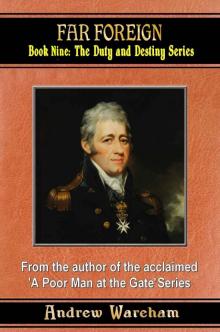 Far Foreign (The Duty and Destiny Series, Book 9)
Far Foreign (The Duty and Destiny Series, Book 9)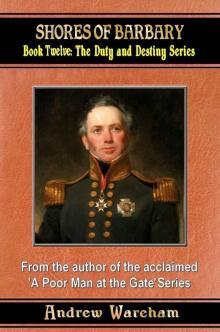 Shores of Barbary (The Duty and Destiny Series, Book 12)
Shores of Barbary (The Duty and Destiny Series, Book 12)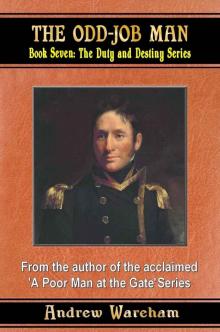 The Odd-Job Man (The Duty and Destiny Series, Book 7)
The Odd-Job Man (The Duty and Destiny Series, Book 7) Fire and Folly (Man of Conflict Series Book 3)
Fire and Folly (Man of Conflict Series Book 3) A Victorian Gent (The Making of a Man Series, Book 1)
A Victorian Gent (The Making of a Man Series, Book 1)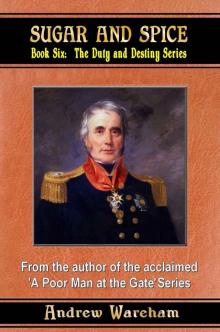 Sugar and Spice (The Duty and Destiny Series, Book 6)
Sugar and Spice (The Duty and Destiny Series, Book 6) Dark Days Of Summer (Innocents At War Series, Book 4)
Dark Days Of Summer (Innocents At War Series, Book 4) Dire Shenanigans (The Making of a Man Series, Book 2)
Dire Shenanigans (The Making of a Man Series, Book 2)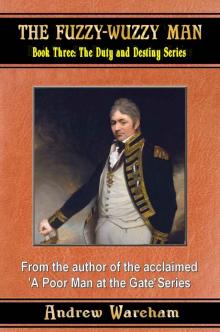 The Fuzzy-Wuzzy Man (The Duty and Destiny Series, Book 3)
The Fuzzy-Wuzzy Man (The Duty and Destiny Series, Book 3) Privilege Preserved (A Poor Man at the Gate Series Book 5)
Privilege Preserved (A Poor Man at the Gate Series Book 5)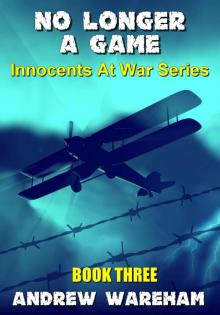 No Longer A Game (Innocents At War Series, Book 3)
No Longer A Game (Innocents At War Series, Book 3)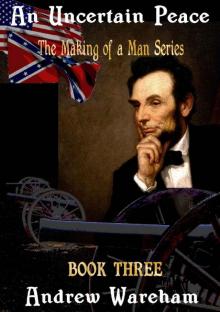 An Uncertain Peace (The Making of a Man Series, Book 3)
An Uncertain Peace (The Making of a Man Series, Book 3)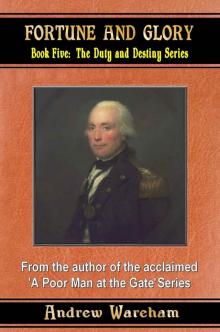 Fortune And Glory (The Duty and Destiny Series, Book 5)
Fortune And Glory (The Duty and Destiny Series, Book 5) The Old Order (A Poor Man at the Gate Series Book 7)
The Old Order (A Poor Man at the Gate Series Book 7) A Place Called Home (Cannibal Country Trilogy, Book 2)
A Place Called Home (Cannibal Country Trilogy, Book 2) Nouveau Riche (A Poor Man at the Gate Series, Book 2)
Nouveau Riche (A Poor Man at the Gate Series, Book 2) The Privateersman (A Poor Man at the Gate Series Book 1)
The Privateersman (A Poor Man at the Gate Series Book 1)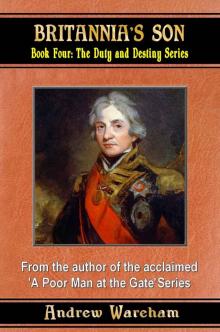 Britannia’s Son (The Duty and Destiny Series, Book 4)
Britannia’s Son (The Duty and Destiny Series, Book 4) Long Way Place (Cannibal Country Trilogy, Book 1)
Long Way Place (Cannibal Country Trilogy, Book 1) Spanish Tricks (Man of Conflict Series, Book 5)
Spanish Tricks (Man of Conflict Series, Book 5) A Parade Of Virtue (A Poor Man At The Gate Series Book 9)
A Parade Of Virtue (A Poor Man At The Gate Series Book 9)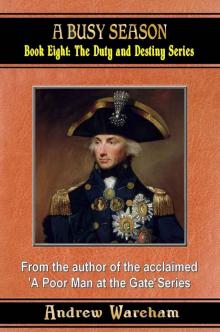 A Busy Season (The Duty and Destiny Series, Book 8)
A Busy Season (The Duty and Destiny Series, Book 8) Billy Bacon and the Soldier Slaves (Colonial Warrior Series, Book 1)
Billy Bacon and the Soldier Slaves (Colonial Warrior Series, Book 1) Raging Rajahs (Man of Conflict Series, Book 2)
Raging Rajahs (Man of Conflict Series, Book 2) Victorian Dawn (A Poor Man at the Gate Series, Book 12)
Victorian Dawn (A Poor Man at the Gate Series, Book 12) Born To Privilege (A Poor Man at the Gate Series Book 3)
Born To Privilege (A Poor Man at the Gate Series Book 3)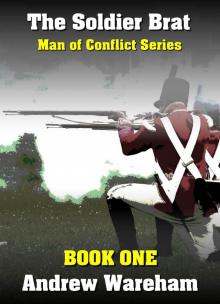 The Soldier Brat (Man of Conflict Series, Book 1)
The Soldier Brat (Man of Conflict Series, Book 1)